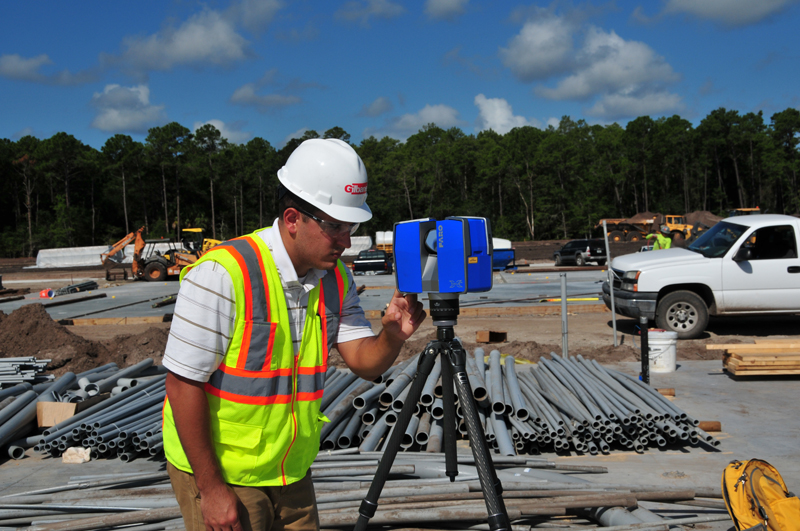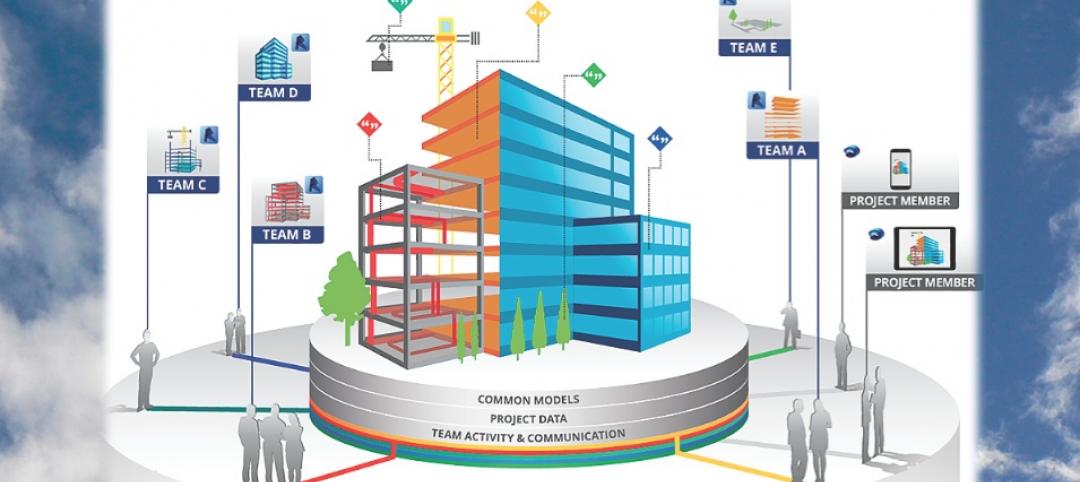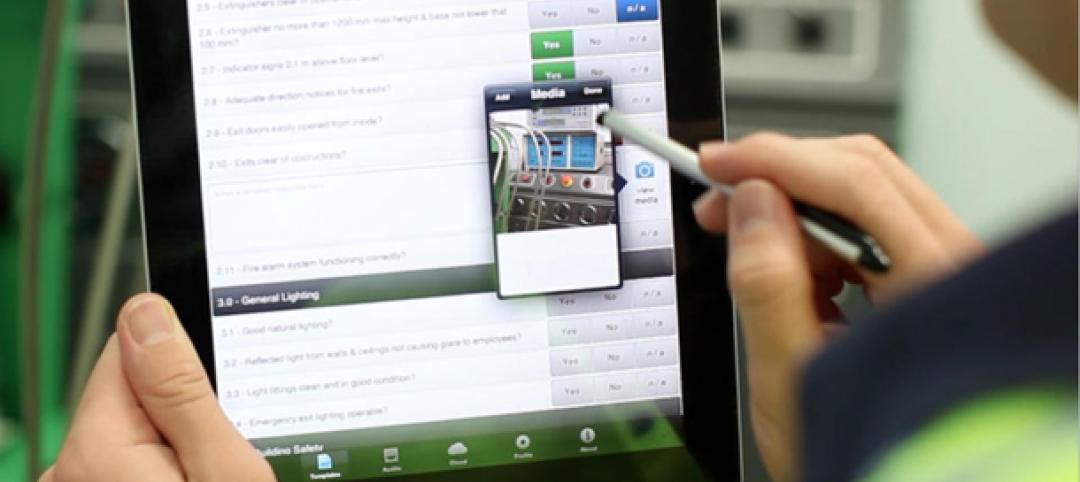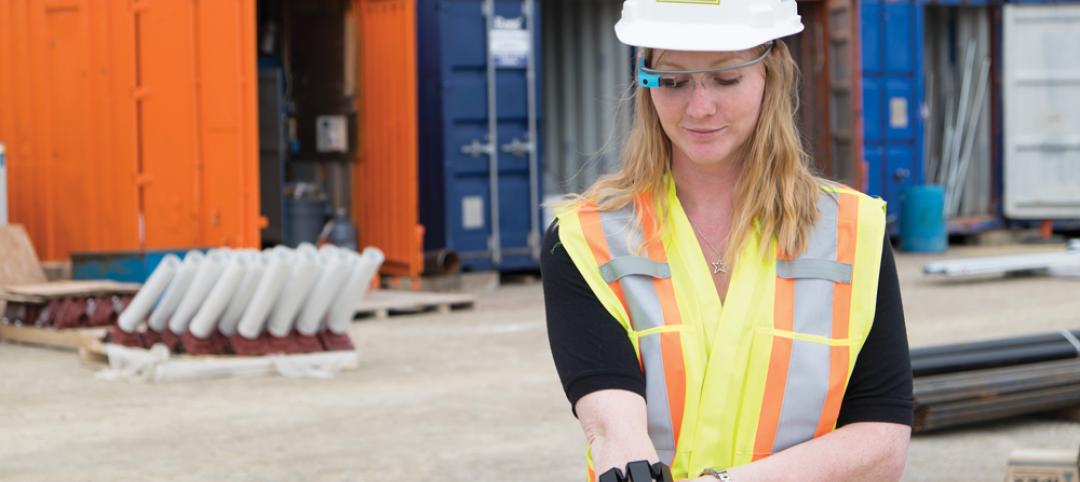Trust but verify. It’s a time-honored treaty enforcement principle. It also works well as a basic mantra for BIM (building information modeling)-based building construction. Just ask the Virtual Design & Construction (VDC) Team at Gilbane, a family-owned and operated construction company. Armed with a phase-shift laser scanner, a Gilbane VDC engineering team recently documented measurement discrepancies on a high-profile building construction project.
Gilbane specializes in the high-wire world of at-risk construction. On occasion, Gilbane is called in to rescue troubled projects. Recently the Gilbane VDC team was summoned to do just that. John Tocci, Jr., Director of the VDC Team sets the stage: “The work involves a new corporate campus, the headquarters of a Fortune 500 company. For various reasons, the previous construction manager was terminated. That happened on a Friday. My team took over the job on Saturday. By Sunday afternoon we were laser scanning part of the project in order to reconcile measurements for Monday morning meetings.”
Trade contractors desperately needed reliable benchmarks to accurately set walls, ducts, pipe, conduit locations, and other assemblies. Then there was the elevator shaft. Laser scanning verified two-inch variations on all sides, with the elevator opening three inches smaller than it should be. There was a new sheriff in town and the trades eventually rallied to the Gilbane VDC team.
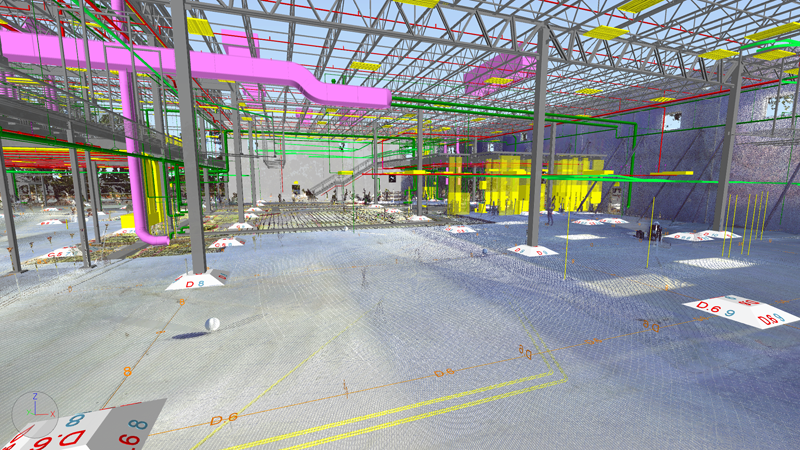
A point cloud of modeled as-built conditions.
“We’ve had a number of cases where the field team, trade contractors, or architects have argued with us about dimensions of existing conditions, Tocci stated. “We’ve been right every time. It underscores the fact that BIM and VDC, no matter how established we think it is, is still an emerging technology.”
As Gilbane discovered the anecdotal side of laser scanning pales in comparison to the dramatic ROI story. “Our first laser scanner paid for itself in the first week of operation,” Tocci reports. “We conservatively calculate we saved about $150,000 on the first project we scanned.” Just one week? Understandably, that kind of near-instant payback may strike some as too good to be true. Believe it, says Tocci. “If anyone wants to reverse engineer the calculations, they’ll quickly see the payback was actually quite larger,” Tocci reports.
“We assigned super-conservative values to all the ordinary construction tasks that scanning eliminates. We factor-in the electrical, mechanical, and plumbing packages on the job. “One week understates it. With scanning, there are no back charges. No finger pointing. No remediation. It’s all because it was measured right the first time,” Tocci says.
Like many risk-adverse businesses, Gilbane takes a careful, deliberate path to integrating new technology into their business. “The Focus3D Laser Scanner changed the industry,” Tocci declares. “When it came out it was three times less expensive than its competitors. Instead of capturing a single point at once, it can capture 978 million points per second. That’s a radically different scenario. It’s so easy for one person to move it around. It captures levels of detail that you didn’t think it could. “It’s an amazing tool. We now verify and find discrepancies that might bite us later on. All that risk goes away. We couldn’t be happier or more impressed,” Tocci says.
More Information:
FARO Technologies
250 Technology Park
Lake Mary, FL 32746
Phone: 407-333-9911 | Fax: 407-333-4181
aec.faro.com
Related Stories
BIM and Information Technology | Jan 29, 2015
Lego X by Gravity elevates the toy to a digital modeling kit
With the Lego X system, users can transfer the forms they’ve created with legos into real-time digital files.
BIM and Information Technology | Jan 28, 2015
5 crucial lessons from moving BIM/VDC workflows to the cloud
Early adopters of cloud-based model collaboration share what they learned in overcoming their toughest hurdles.
Mixed-Use | Jan 26, 2015
MVRDV designs twisty skyscraper to grace Vienna's skyline
The twist maximizes floor space and decreases the amount of shadows the building will cast on the surrounding area.
| Jan 21, 2015
Schneider Electric and Autodesk begin collaboration on building lifecycle management
Schneider Electric has announced the signature of a Memorandum of Understanding, which states that Schneider Electric and Autodesk plan to collaborate to enhance current practices for building lifecycle management based on BIM.
| Jan 8, 2015
Microsoft shutters classic clipart gallery: Reaction from a graphic designer
Microsoft shut down its tried-and-true clipart gallery, ridding the world not only of a trope of graphic design, but a nostalgic piece of digital design history, writes HDR's Dylan Coonrad.
| Jan 7, 2015
How you can help improve the way building information is shared
PDFs are the de facto format for digital construction documentation. Yet, there is no set standard for how to produce PDFs for a project, writes Skanska's Kyle Hughes.
| Dec 29, 2014
Startup Solarbox London turns phone booths into quick-charge stations [BD+C's 2014 Great Solutions Report]
About 8,000 of London’s famous red telephone boxes sit unused in warehouses, orphans of the digital age. Two entrepreneurs plan to convert them into charging stations for mobile devices. Their invention was named a 2014 Great Solution by the editors of Building Design+Construction.
| Dec 29, 2014
Hard hat equipped with smartglass technology could enhance job site management [BD+C's 2014 Great Solutions Report]
Smart Helmet is equipped with an array of cameras that provides 360-degree vision through its glass visor, even in low light. It was named a 2014 Great Solution by the editors of Building Design+Construction.
| Dec 29, 2014
New data-gathering tool for retail designers [BD+C's 2014 Great Solutions Report]
Beacon technology personalizes smartphone messaging, creating a new information resource for store designers. It was named a 2014 Great Solution by the editors of Building Design+Construction.
| Dec 29, 2014
Wearable job site management system allows contractors to handle deficiencies with subtle hand and finger gestures [BD+C's 2014 Great Solutions Report]
Technology combines a smartglass visual device with a motion-sensing armband to simplify field management work. The innovation was named a 2014 Great Solution by the editors of Building Design+Construction.


